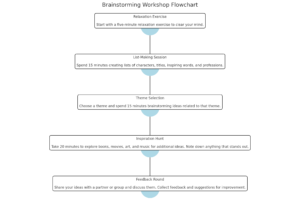About Lesson
Understanding the Importance of Brainstorming
- Problem-Solving: Every idea will encounter problems; the key is to find creative solutions that help refine and define your project.
- Idea Generation: Brainstorming is crucial for generating diverse and innovative ideas, which are the foundation of a compelling game.
Effective Brainstorming Techniques
- Relaxation
- Clear Your Mind: Take a moment to relax and clear your mind. Stress can hinder creativity.
- Meditation or Light Exercise: Engage in activities that help you relax and open your mind to new ideas.
- List-Making
- Possible Characters: Create lists of potential characters, their traits, and backstories.
- Titles: Brainstorm possible titles that capture the essence of your game.
- Inspiring Words: Write down words that inspire you or are related to your game’s theme.
- Professions: Think about various professions that could influence your game’s characters or story.
- Theme Exploration
- Select a Theme: Choose a theme such as travel, ghost stories, or sci-fi. Themes can provide a cohesive direction for your brainstorming.
- Theme-Related Ideas: Generate ideas that fit within your chosen theme, considering settings, characters, and plot points.
- Seek Outside Inspiration
- Books and Movies: Look to your favorite books, movies, and TV shows for inspiration. Consider what elements you enjoyed and how they could be adapted to your game.
- Art and Music: Explore various art forms and music genres to spark new ideas and themes.
- Feedback
- Peer Review: Share your ideas with friends, colleagues, or online communities. Getting feedback can provide new perspectives and improve your concepts.
- Iterative Improvement: Use the feedback to refine and develop your ideas further. Don’t be afraid to iterate and evolve your concepts.
Activity:

Homework: Brainstorming Journal
- Daily Entries: Maintain a brainstorming journal where you jot down at least three new ideas every day. Reflect on these ideas weekly and see how they can be integrated into your game design.